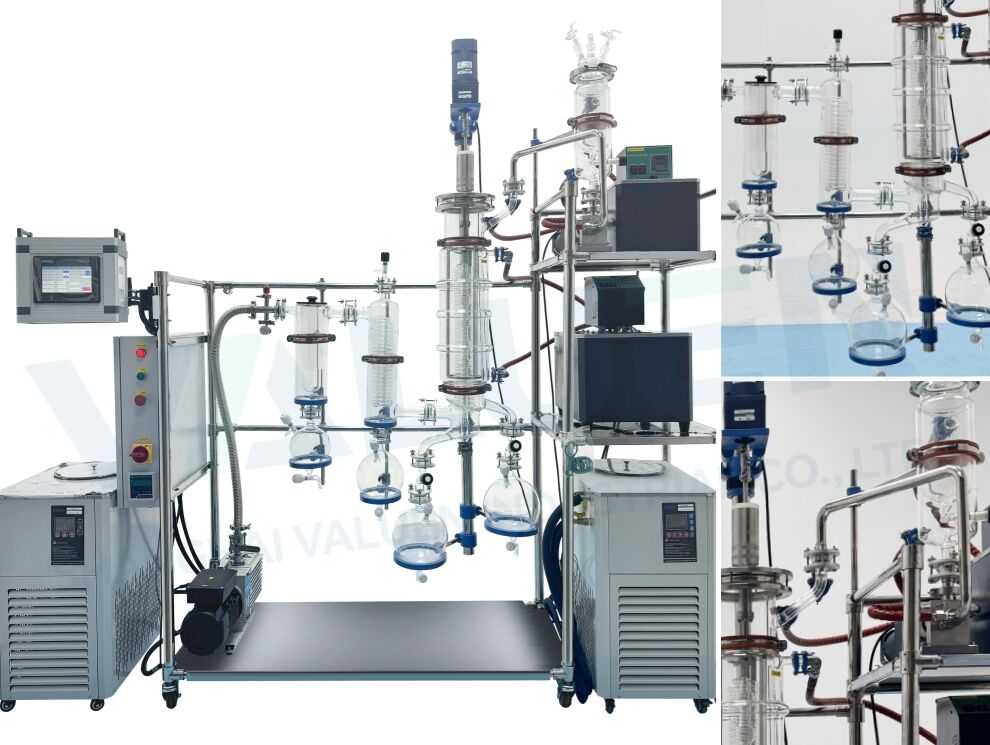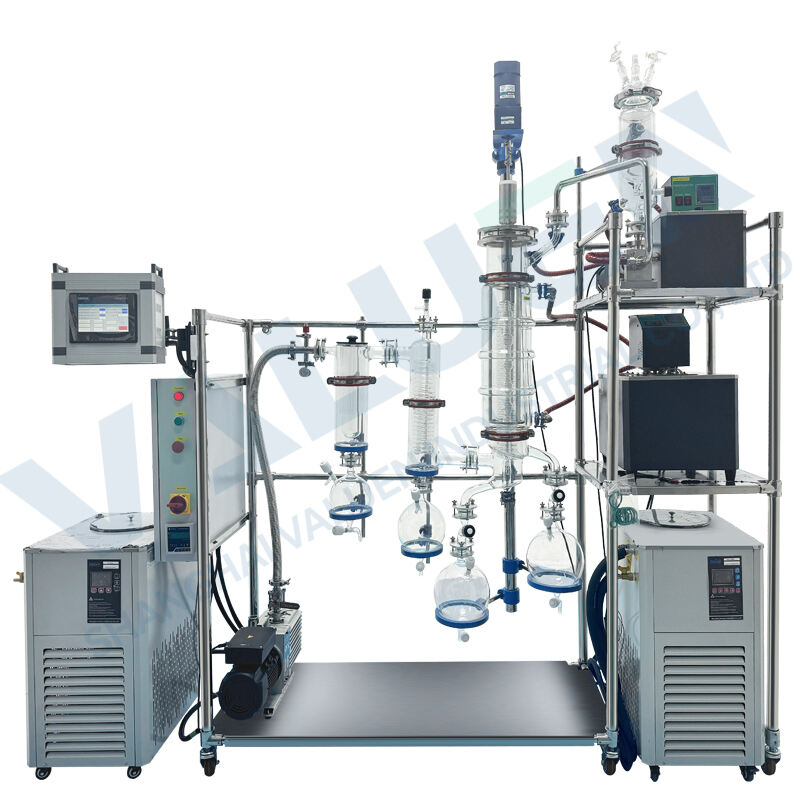Understanding the Revolutionary Impact of Glass Molecular Distillation Technology
The evolution of laboratory equipment has brought forth remarkable innovations, with the glass molecular distillation system standing at the forefront of separation technology. This sophisticated apparatus has transformed how researchers and scientists approach the purification of sensitive compounds. By utilizing the principles of molecular distillation under carefully controlled conditions, these systems enable the separation of complex mixtures with unprecedented precision and efficiency.
Modern glass molecular distillation systems represent a significant advancement in laboratory technology, offering capabilities that traditional distillation methods simply cannot match. Their unique design and operational principles make them indispensable tools in various scientific fields, from pharmaceutical research to material science.

Core Components and Design Excellence
Advanced Glass Construction Elements
The heart of a glass molecular distillation system lies in its meticulously crafted glass components. High-quality borosilicate glass construction ensures exceptional chemical resistance and thermal stability, making it ideal for handling diverse compounds. The transparent nature of glass also allows researchers to observe the entire distillation process in real-time, enabling better control and monitoring of separation procedures.
The system's glass components are precision-engineered to maintain optimal vacuum conditions, featuring specialized joints and connections that prevent any compromise in the distillation environment. This attention to detail in construction ensures consistent performance and reliable results across multiple experimental runs.
Innovative Vacuum Technology Integration
A distinguishing feature of the glass molecular distillation system is its sophisticated vacuum technology. The system incorporates advanced vacuum pumps and sealed mechanisms that can achieve and maintain extremely low pressures, essential for molecular distillation processes. This capability allows for the separation of heat-sensitive compounds at lower temperatures than conventional distillation methods.
The vacuum system's design includes multiple safety features and precise control mechanisms, ensuring stable operation even during extended distillation runs. This reliability is crucial for research applications where consistency and reproducibility are paramount.
Performance Benefits and Operational Advantages
Superior Separation Efficiency
When it comes to separation efficiency, the glass molecular distillation system excels in handling complex mixtures. The system's design enables the achievement of high separation factors, resulting in products of exceptional purity. This capability is particularly valuable when working with compounds that have similar boiling points or those that are temperature-sensitive.
The system's ability to operate at lower temperatures while maintaining high separation efficiency helps preserve the integrity of sensitive molecules, making it invaluable for pharmaceutical and biochemical applications. Researchers can achieve precise fractionation without risking thermal degradation of their valuable compounds.
Enhanced Process Control and Monitoring
The transparent nature of the glass molecular distillation system provides unprecedented visibility into the distillation process. Researchers can observe the formation and movement of distillate films, allowing for real-time adjustments to optimize separation parameters. This visual feedback is crucial for process development and optimization.
Modern systems often incorporate digital controls and monitoring capabilities, enabling precise adjustment of critical parameters such as temperature, pressure, and feed rate. This level of control ensures reproducible results and facilitates the development of standardized protocols for specific applications.
Applications and Versatility
Research and Development Applications
The glass molecular distillation system finds extensive use in research laboratories across various disciplines. In pharmaceutical research, it enables the purification of active pharmaceutical ingredients (APIs) and the isolation of natural products. Material scientists utilize these systems for the preparation of high-purity compounds essential for advanced materials development.
The system's versatility extends to environmental research, where it aids in the analysis and separation of complex environmental samples. Its ability to handle small quantities of material makes it particularly valuable for preliminary studies and method development.
Industrial Scale-up Considerations
While primarily used in laboratory settings, the principles and processes developed using glass molecular distillation systems can be effectively scaled up for industrial applications. The insights gained from laboratory-scale operations provide valuable data for process optimization and scale-up calculations.
The transparent nature of the glass system allows researchers to visualize and understand process dynamics, making it an excellent tool for developing and refining separation protocols before implementing them at larger scales. This capability significantly reduces the time and resources required for process development.
Maintenance and Longevity Considerations
Proper Care and Cleaning Protocols
To maintain optimal performance, glass molecular distillation systems require specific care and maintenance procedures. Regular cleaning and inspection of glass components ensure continued efficiency and prevent cross-contamination between experiments. The system's design typically allows for easy disassembly and thorough cleaning of individual components.
Proper storage and handling procedures help prevent damage to delicate glass components and extend the system's operational life. Training laboratory personnel in correct maintenance protocols is essential for ensuring long-term reliability and performance.
Troubleshooting and Performance Optimization
Understanding common operational issues and their solutions is crucial for maintaining system efficiency. Regular monitoring of vacuum levels, temperature control, and distillate collection helps identify potential problems before they affect experimental results. Implementing preventive maintenance schedules can significantly reduce downtime and repair costs.
Modern glass molecular distillation systems often include diagnostic features that help identify performance issues and guide maintenance activities. This proactive approach to system management ensures consistent performance and reliable results.
Frequently Asked Questions
How does temperature control in a glass molecular distillation system compare to conventional distillation methods?
Glass molecular distillation systems offer superior temperature control due to their ability to operate under high vacuum conditions. This allows for distillation at significantly lower temperatures compared to conventional methods, making them ideal for heat-sensitive compounds. The precise temperature control, combined with the system's design, enables more efficient separation while minimizing thermal degradation.
What makes glass the preferred material for molecular distillation systems in laboratories?
Glass is preferred for molecular distillation systems due to its chemical inertness, thermal stability, and transparency. These properties allow for visual monitoring of the distillation process, ensure minimal interaction with distilled compounds, and provide excellent heat transfer characteristics. Additionally, glass components are easily cleaned and maintain their performance characteristics over extended periods of use.
Can glass molecular distillation systems handle continuous operation?
Yes, modern glass molecular distillation systems are designed for both batch and continuous operation. While laboratory-scale systems are often used for batch processing, they can be configured for continuous operation when needed. The key is maintaining stable vacuum conditions and consistent feed rates, which these systems are well-equipped to handle through their advanced design and control features.
What safety features are typically incorporated into glass molecular distillation systems?
Glass molecular distillation systems incorporate multiple safety features, including vacuum release valves, temperature monitors, and pressure sensors. The systems often have emergency shutdown capabilities and are designed with thick-walled glass components to withstand operating conditions. Additionally, they typically include features to prevent overheating and maintain stable vacuum conditions throughout operation.
Table of Contents
- Understanding the Revolutionary Impact of Glass Molecular Distillation Technology
- Core Components and Design Excellence
- Performance Benefits and Operational Advantages
- Applications and Versatility
- Maintenance and Longevity Considerations
-
Frequently Asked Questions
- How does temperature control in a glass molecular distillation system compare to conventional distillation methods?
- What makes glass the preferred material for molecular distillation systems in laboratories?
- Can glass molecular distillation systems handle continuous operation?
- What safety features are typically incorporated into glass molecular distillation systems?

